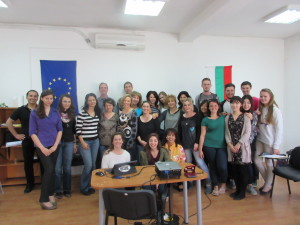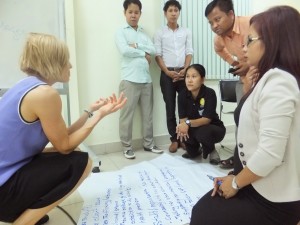Training Organizations
 Addressing trafficking in persons from a health care perspective is so much more than merely providing medicine. Many organizations do not realize how profoundly beneficial having staff trained in areas from basic first aid to more complex issues such as sexually transmitted infections can impact your work.
Addressing trafficking in persons from a health care perspective is so much more than merely providing medicine. Many organizations do not realize how profoundly beneficial having staff trained in areas from basic first aid to more complex issues such as sexually transmitted infections can impact your work.
The health needs of people suffering abuse, exploitation, and trafficking range from the very basic to quite complex. On top of that, serving your beneficiaries in a low resource setting can further complicate matters. Relentless can equip your organization, your staff, and/or your beneficiaries in developing a more robust health and wellness component to your interventions. This is done through trainings, workshops, and guidelines employed with a variety of teaching modalities.
We can’t prevent every emergency or problem, but we can help you navigate those situations when they arise. We can help mitigate health issues from escalating into crises by equipping you to know how to handle certain health problems. Knowing how our bodies work and how to keep them well will empower your staff as well as your beneficiaries to improve their well-being. This, in turn, can help save your organization time, money, and energy.
The following are some questions that you may have had regarding the work you do either on outreach, in an aftercare setting, or a drop-in center.
- The last time you were treating a bleeding wound or a burn, did you wonder if you were doing it properly?
- Have you ever wondered what kinds of things that should be in a medical kit and how to use them?
- What does it mean when someone is cutting on themselves? Is it a risk for suicide? Why do they do that?
- What do those test results mean and what exactly should we do about it?
- How can we get our beneficiaries (or ourselves) to stop smoking?
Your staff:
- Will be prepared to handle medical emergencies, and know when hospital care is necessary
- Will know how to deal with their own illnesses, as well as health issues that arise with your beneficiaries.
- When your staff is better equipped to handle health issues, the burden of stress at work will lighten, which then helps decrease compassion fatigue and burnout of your staff.
Your beneficiaries:
- Will be empowered to take more responsibility for their own well-being.
- Will have a greater capacity to take care of themselves as well as others upon (re)integration into mainstream society.
 Training workshops are designed to build your capacity to meet the health needs of your beneficiaries. The workshops are designed to help you know when to go to the hospital or clinic, and what you can treat yourselves. For example, you will be able to know what should go into a medical kit and how to use those items. Furthermore, these workshops can help your beneficiaries in the process of becoming independent and empowered to take on a life of wholeness and well-being after leaving your care.
Training workshops are designed to build your capacity to meet the health needs of your beneficiaries. The workshops are designed to help you know when to go to the hospital or clinic, and what you can treat yourselves. For example, you will be able to know what should go into a medical kit and how to use those items. Furthermore, these workshops can help your beneficiaries in the process of becoming independent and empowered to take on a life of wholeness and well-being after leaving your care.
Training, workshop, and seminar topics:
- First aid, wound care, medical kits (for shelter, drop-in center, or outreach kit)
- CPR
- Outfitting your organization with medical kit(s), records and documentation
- Fever and other minor infectious diseases (common cold)
- Other infectious diseases such as tuberculosis and dengue
- Common health problems: gastrointestinal distress, headache, etc
- Sexually transmitted infections: symptoms, identification and testing
- Reproductive health – basic anatomy and physiology
- Smoking cessation, and other addictions
- Nutrition
- Staff care, self-care
- Other topics…
One goal that we can all agree on is the holistic re-integration of our beneficiaries into a thriving life on their own. Prospective research is beginning to reveal that education about basic health, nutrition, reproductive health, and other topics are a necessary component of education for beneficiaries in the aftercare setting.
Because Relentless cannot be everywhere to teach everyone in person, a series of “Bridge Guides” has been developed. These are documents to help those who care for abused, exploited, and trafficked people incorporate sound health practices into their interventions. They are designed to help bridge the gap between the non-medically trained staff and local health care professionals (particularly in low-resource settings). They are also designed to help standardize and streamline the health care your beneficiaries receive under your care. However, they are not designed to replace a health care consultant, but may aid in decision-making. Health care professionals are available to address your questions by email or by Skype regarding individual cases.
For more reading, please see the blog post “Transformational Care“.
Responses from participants:
“At first I was reluctant to participate in the training regarding female reproductive system, but I’m glad that I did. I understand my wife a bit better now!”
– Cambodian male staff worker.
“After the wound care training, I went back to my home village for a holiday. Someone there had a motorcycle accident and I was able to do the first aid. I never would have been able to do that before!” – Cambodian female staff worker